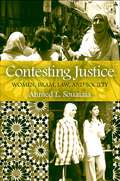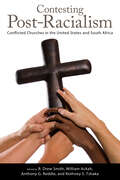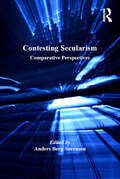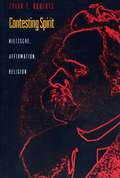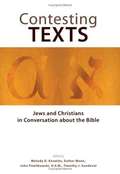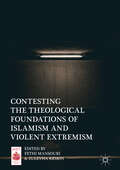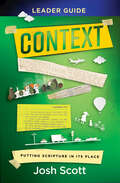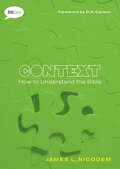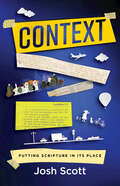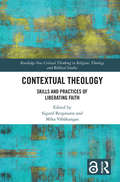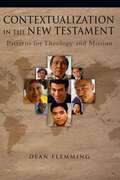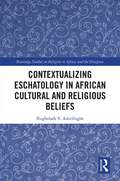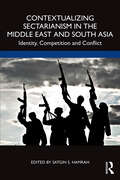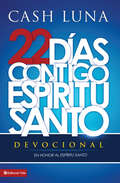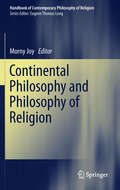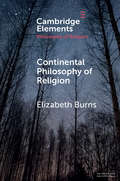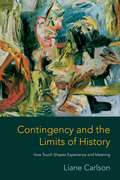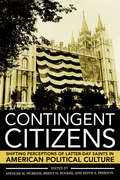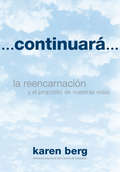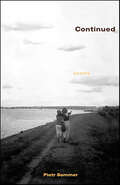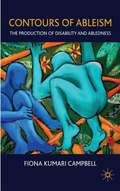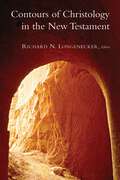- Table View
- List View
Contesting Indonesia: Islamist, Separatist, and Communal Violence since 1945 (Cornell Modern Indonesia Project)
by Kirsten E. SchulzeContesting Indonesia explains Islamist, separatist and communal violence across Indonesian history since 1945. In a sweeping argument that connects endemic violence to a national narrative, Kirsten E. Schulze finds that the outbreak of violence is related to competing local notions of the national imaginary as well as contentious belonging.Through detailed examination of six case studies: the Darul Islam rebellions, Jemaah Islamiyah's jihad, and the conflicts in East Timor, Aceh, Poso, and Ambon, Schulze argues that violence was more likely to occur in places that are on the geographic, ideological, ethnic, and religious periphery of the Indonesian state; that violence by non-state actors was most protracted in locations where there was a well-established alternative national imaginary supported by an alternative historical narrative; and that violence by the state was most likely in places where the state had a significant territorial interest. Drawing on a vast collection of interviews and archival and published sources, Contesting Indonesia provides a new understanding of the history of violence across the Indonesian archipelago.
Contesting Justice: Women, Islam, Law, and Society
by Ahmed E. SouaiaiaContesting Justice examines the development of the laws and practices governing the status of women in Muslim society, particularly in terms of marriage, polygamy, inheritance, and property rights. Ahmed E. Souaiaia argues that such laws were not methodically derived from legal sources but rather are the preserved understanding and practices of the early ruling elite. Based on his quantitative, linguistic, and normative analyses of Quranic texts—and contrary to the established practice—the author shows that these texts sanction only monogamous marriages, guarantee only female heirs' shares, and do not prescribe an inheritance principle that awards males twice the shares of females. He critically explores the way religion is developed and then is transformed into a social control mechanism that transcends legal reform, gender-sensitive education, or radical modernization. To ameliorate the legal, political, and economic status of women in the Islamic world, Souaiaia recommends the strengthening of civil society institutions that will challenge wealth-engendered majoritism, curtail society-manufactured conformity, and bridle the absolute power of the state.
Contesting Post-Racialism: Conflicted Churches in the United States and South Africa
by R. Drew Smith, William Ackah, Anthony G. Reddie, and Rothney S. TshakaContributions by William Ackah, Allan Boesak, Ebony Joy Fitchue, Leah Gaskin Fitchue, Walter Earl Fluker, Forrest E. Harris Sr., Nico Koopman, AnneMarie Mingo, Reggie Nel, Chabo Freddy Pilusa, Anthony G. Reddie, Boitumelo Senokoane, Rothney S. Tshaka, Luci Vaden, Vuyani Vellem, and Cobus van WyngaardAfter the 2008 election and 2012 reelection of Barack Obama as US president and the 1994 election of Nelson Mandela as the first of several blacks to serve as South Africa's president, many within the two countries have declared race to be irrelevant. For contributors to this volume, the presumed demise of race may be premature. Given continued racial disparities in income, education, and employment, as well as in perceptions of problems and promise within the two countries, much healing remains unfinished. Nevertheless, despite persistently pronounced disparities between black and white realities, it has become more difficult to articulate racial issues. Some deem "race" an increasingly unnecessary identity in these more self-consciously "post-racial" times.The volume engages post-racial ideas in both their limitations and promise. Contributors look specifically at the extent to which a church's contemporary response to race consciousness and post-racial consciousness enables it to give an accurate public account of race.
Contesting Secularism: Comparative Perspectives (AHRC/ESRC Religion and Society Series)
by Anders Berg-SorensenAs we enter the twenty-first century, the role of religion within civic society has become an issue of central concern across the world. The complex trends of secularism, multiculturalism and the rise of religiously motivated violence raise fundamental questions about the relationship between political institutions, civic culture and religious groups. Contesting Secularism represents a major intervention into this debate. Drawing together contributions from leading scholars from across the world it analyses how secularism functions as a political doctrine in different national contexts put under pressure by globalisation. In doing so it presents different models for the relationship between political institutions and religious groups, challenging the reader to be more aware of assumptions within their own cultural context, and raises alternative possibilities for the structure of democratic, multi-faith societies. Through its inter-disciplinary and comparative approach, Contesting Secularism sets a new agenda for thinking about the place of religion in the public sphere of twenty-first century societies. It is essential reading for policymakers, as well as for scholars and students in political science, law, sociology and religious studies.
Contesting Spirit: Nietzsche, Affirmation, Religion
by Tyler T. RobertsChallenging the dominant scholarly consensus that Nietzsche is simply an enemy of religion, Tyler Roberts examines the place of religion in Nietzsche's thought and Nietzsche's thought as a site of religion. Roberts argues that Nietzsche's conceptualization and cultivation of an affirmative self require that we interrogate the ambiguities that mark his criticisms of asceticism and mysticism. What emerges is a vision of Nietzsche's philosophy as the enactment of a spiritual quest informed by transfigured versions of religious tropes and practices.Nietzsche criticizes the ascetic hatred of the body and this-worldly life, yet engages in rigorous practices of self-denial--he sees philosophy as such a practice--and affirms the need of imposing suffering on oneself in order to enhance the spirit. He dismisses the "intoxication" of mysticism, yet links mysticism, power, and creativity, and describes his own self-transcending experiences. The tensions in his relation to religion are closely related to that between negation and affirmation in his thinking in general. In Roberts's view, Nietzsche's transfigurations of religion offer resources for a postmodern religious imagination. Though as a "master of suspicion," Nietzsche, with Freud and Marx, is an integral part of modern antireligion, he has the power to take us beyond the flat, modern distinction between the secular and the religious--a distinction that, at the end of modernity, begs to be reexamined.
Contesting Texts: Jews and Christians in Conversation About the Bible
by Melody D. Knowles Esther Menn John Pawlikowski Timothy J. SandovalThe essays in Contesting Texts: Jews and Christians in Conversation about the Bible emerge from a conference bearing the same name that took place February 28-March 1, 2005, in Chicago.
Contesting the Theological Foundations of Islamism and Violent Extremism (Middle East Today)
by Fethi Mansouri Zuleyha KeskinThis edited volume discusses critically discursive claims about the theological foundations connecting Islam to certain manifestations of violent extremism. Such claims and associated debates become even more polarizing when images of violent acts of terrorism performed in the name of Islam circulate in the global media. The authors argue that the visibility of such mediated violent extremism, in particular since the emergence of ISIS, has created a major political and security challenge not only to the world but also to the global Muslim community. This is particularly true in relation to the way Islam is being understood and characterized in the modern world. Existing studies on radicalization generally deal with causes and strategies to address violent extremism. The book will appeal to scholars, researchers and students in political science, Middle Eastern and Islamic Studies.
Context Leader Guide: Putting Scripture in Its Place
by Josh ScottExploring the Chapter Behind the Verse. The Leader Guide contains everything needed to guide a group through the six-week study, including session plans, activities, discussion questions, and multiple format options. Components include a book, Context: Putting Scripture in Its Place, and video teaching sessions featuring Josh Scott, making this perfect as a group study throughout the year. Context looks at verses we know by heart but may not know the people, places, and times that give them meaning. Josh Scott delves into these well-known Scripture verses, exploring their true meanings by examining them in their original biblical context. Through this process, he unveils fresh and enlightening interpretations that are often missed when these Scriptures are taken out of context.
Context: How to Understand the Bible (Bible Savvy Series)
by James L. NicodemHow do we understand a book as complex as the Bible? History, laws, poetry, prophecy, apocalypse, letters... and all of it written thousands of years ago!The answer is context.In this uncomplicated, clarifying book, Pastor Jim Nicodem explains how to accurately interpret a Bible passage by unpacking its various contexts. Start with its historical setting: author, recipient, date, and purposeThen determine its literary genre: law, narrative, prophecy, poetry, gospel, or epistle. Finally, identify the key theological issues. Sound difficult? Not once you employ the simple study tools the book includes.Perfect for everyone, from first-time Bible readers to Bible study leaders, Context is a wonderful tool to help with basic Bible reading or more in-depth study.
Context: How to Understand the Bible (Bible Savvy Series)
by James L. NicodemHow do we understand a book as complex as the Bible? History, laws, poetry, prophecy, apocalypse, letters... and all of it written thousands of years ago!The answer is context.In this uncomplicated, clarifying book, Pastor Jim Nicodem explains how to accurately interpret a Bible passage by unpacking its various contexts. Start with its historical setting: author, recipient, date, and purposeThen determine its literary genre: law, narrative, prophecy, poetry, gospel, or epistle. Finally, identify the key theological issues. Sound difficult? Not once you employ the simple study tools the book includes.Perfect for everyone, from first-time Bible readers to Bible study leaders, Context is a wonderful tool to help with basic Bible reading or more in-depth study.
Context: Putting Scripture in Its Place
by Josh ScottExploring the Chapter Behind the Verse. Context looks at verses we know by heart but may not know the people, places, and times that give them meaning. Josh Scott delves into these well-known Scripture verses, exploring their true meanings by examining them in their original biblical context. Through this process, he unveils fresh and enlightening interpretations that are often missed when these Scriptures are taken out of context. The book can be read alone or used by small groups anytime throughout the year. Components include video teaching sessions featuring Josh Scott and a comprehensive Leader Guide, making this perfect as a six-week group study.
Contextual Theology: Skills and Practices of Liberating Faith (Routledge New Critical Thinking in Religion, Theology and Biblical Studies)
by Sigurd Bergmann Mika VähäkangasThis book advances that history by exploring stories, images and discourses across a worldwide range of geographical, cultural and confessional contexts. Its twelve authors not only enrich our understanding of the significance of the contextual method, but also produce a new range of original ways of doing theology in contemporary situations. The authors discuss some prioritised thematic perspectives with an emphasis on liberating paths, and expand the ongoing discussion on the methodology of theology into new areas. Themes such as interreligious plurality, global capitalism, ecumenical liberation theology, eco-anxiety and the anthropocene, postcolonialism, gender, neo-pentecostalism, world theology, and reconciliation are examined in situated depth. Additionally, voices from Indigenous lands, Latin America, Asia, Africa, Australia, and Europe and North America enter into a dialogue on what it means to contextualise theology in an increasingly globalised and ever-changing world. Such a comprehensive discussion of new ways of thinking about and doing contextual theology will be of great use to scholars in Theology, Religious Studies, Cultural Studies, Political Science, Gender Studies, Environmental Humanities, and Global Studies.
Contextualization in the New Testament: Patterns for Theology and Mission
by Dean E. FlemmingHonored as one of the "Fifteen Outstanding Books for Mission Studies" by International Bulletin of Missionary Research From Cairo to Calcutta, from Cochabamba to Columbus, Christians are engaged in a conversation about how to speak and live the gospel in today's traditional, modern and emergent cultures. The technical term for their efforts is contextualization. Missionary theorists have pondered and written on it at length. More and more, those who do theology in the West are also trying to discover new ways of communicating and embodying the gospel for an emerging postmodern culture. But few have considered in depth how the early church contextualized the gospel. And yet the New Testament provides numerous examples. As both a crosscultural missionary and a New Testament scholar, Dean Flemming is well equipped to examine how the early church contextualized the gospel and to draw out lessons for today. By carefully sifting the New Testament evidence, Flemming uncovers the patterns and parameters of a Paul or Mark or John as they spoke the Word on target, and he brings these to bear on our contemporary missiological task. Rich in insights and conversant with frontline thinking, this is a book that will revitalize the conversation and refresh our speaking and living the gospel in today's cultures, whether in traditional, modern or emergent contexts.
Contextualizing Eschatology in African Cultural and Religious Beliefs (Routledge Studies on Religion in Africa and the Diaspora)
by Ibigbolade S. AderibigbeContextualizing Eschatology in African Cultural and Religious Beliefs addresses the African consciousness and nuances of eschatological beliefs as part and parcel of the holistic African Indigenous worldviews within the context of the people's traditional heritage. The concept of eschatology is usually explained from the perspective of "endtimes" in relation to either the human individual or the cosmos. Within these contexts, the primary interests, particularly with regard to human eschatology, have centred on the questions of death, afterlife, immortality, destiny, judgment, reward and punishment, and the final destination or eternal "home" of humans. This book explores the characteristic nature, the modes, the process as well as the dynamics associated with the various features culminating the functional expression of the "reality" of eschatological beliefs demonstrated in varied but fundamentally the same subject matter of practices among different African ethnic groups. It also discusses the influences of other religious traditions, particularly Christianity and Islam, on contemporary African eschatological thoughts and their attendant consequences. This book will be of interest to students and scholars of African studies, eschatology, religious studies, and the philosophy of religion.
Contextualizing Sectarianism in the Middle East and South Asia: Identity, Competition and Conflict
by Satgin HamrahStates across the Muslim world are faced with challenges associated with a perpetual cycle of conflict and violence organized along sectarian lines. To understand modern-day sectarianism, it is essential to move beyond explanations that focus predominantly on ancient Sunni-Shia animosities or a singular lens. It is important to engage in interdisciplinary and multidirectional examinations to better understand how sectarianism is strategically utilized by political entrepreneurs. Moreover, while religious identities and how individuals define themselves and their communities are important, it is also integral to analyze how identity has been utilized in historical and contemporary political contexts on state and non-state levels. This volume seeks to fill gaps in understanding the complexities associated with sectarianism through a transnational interdisciplinary analytical framework to enhance understanding of the socio-political, religio-political, cultural and security landscapes of the Middle East and South Asia. It also challenges narratives regarding sectarian divisions between Sunnis and Shias and deconstructs popular misconceptions about sectarianism, its spatial and temporal impact, as well as its influence on identities, conflict, and competition. The volume will be of interest to scholars and researchers of the Middle East and South Asia, and those interested in history, politics, international relations, international security, religion, and sociology.
Contigo, Espíritu Santo: Devocional
by Cash LunaEl pastor y autor Cash Luna vuelve a desafiarnos a caminar con Dios y nos invita a una experiencia radical con el Espíritu Santo. 22 Días Contigo, Espíritu Santo es el devocional que estabas esperando. Se trata de veintidós intensos días en los que nuestra voluntad y anhelos personales son tocados por la acción del Espíritu a través de la edificación en su Palabra, la reflexión continua, la oración constante y específica, y la aplicación inmediata a nuestra vida, justo en donde nos encontramos. La presencia del Espíritu de Dios en nuestras vidas se encargará de transformarnos. Incluye un enlace para descargar gratuitamente música devocional.
Continental Philosophy and Philosophy of Religion (Handbook of Contemporary Philosophy of Religion #4)
by Morny JoyThis is the first book that provides access to twelve Continental philosophers and the consequences of their thinking for the philosophy of religion. Basically, in the second half of the twentieth century, it has been treated from within the Anglo- American school of philosophy, which deals mainly with proofs and truths, and questions of faith. This approach is more concerned with human experience, and pays more attention to historical context and cultural influences. As such, it provides challenging questions about the way forward for philosophy of religion in the twenty-first century.
Continental Philosophy of Religion (Elements in the Philosophy of Religion)
by Elizabeth BurnsThis Element presents key features from the writings on religion of twelve philosophers working in or influenced by the continental tradition (Hegel, Kierkegaard, Nietzsche, Heidegger, Rosenzweig, Tillich, Derrida, Caputo, Levinas, Hadot, Jantzen, and Anderson). It argues for a hybrid methodology which enables transformational religious responses to the problems associated with human existence (the existential problems of meaning, suffering, and death) to be supported both by reasoned argument and by revelation, narrative philosophy, and experiential verification.
Contingency and the Limits of History: How Touch Shapes Experience and Meaning
by Liane CarlsonCentral to the historicizing work of recent decades has been the concept of contingency, the realm of chance, change, and the unnecessary. Following Nietzsche and Foucault, genealogists have deployed contingency to show that all institutions and ideas could have been otherwise as a critique of the status quo. Yet scholars have spent very little time considering the genealogy of contingency itself—or what its history means for its role in politics.In Contingency and the Limits of History, Liane Carlson historicizes contingency by tying it to its theological and etymological roots in “touch,” contending that much of its critical, disruptive power is specific to our current historical moment. She returns to an older definition of contingency found in Christian theology that understands it as the lot of mortal creatures, who suffer, feel, bleed, and change, in contrast to a necessary, unchanging, impassible God. Far from dying out, Carlson reveals, this theological past persists in continental philosophy, where thinkers such as Novalis, Schelling, Merleau-Ponty, and Serres have imagined contingency as a type of radical destabilization brought about by the body’s collision with a changing world. Through studies of sickness, loneliness, violation, and love, she shows that different experiences of contingency can lead to dramatically dissimilar ethical and political projects. A strikingly original reconsideration of one of continental philosophy and critical theory’s most cherished concepts, this book reveals the limits of historicist accounts.
Contingent Citizens: Shifting Perceptions of Latter-day Saints in American Political Culture
Contingent Citizens features fourteen essays that track changes in the ways Americans have perceived the Latter-day Saints since the 1830s. From presidential politics, to political violence, to the definition of marriage, to the meaning of sexual equality—the editors and contributors place Mormons in larger American histories of territorial expansion, religious mission, Constitutional interpretation, and state formation. These essays also show that the political support of the Latter-day Saints has proven, at critical junctures, valuable to other political groups. The willingness of Americans to accept Latter-day Saints as full participants in the United States political system has ranged over time and been impelled by political expediency, granting Mormons in the United States an ambiguous status, contingent on changing political needs and perceptions.
Continuará...
by Karen BergAwareness of our soul's journey creates a context that helps us to guide our lives and appreciate what we were given. With this knowledge, our soul will eventually manage-over many lifetimes, to be sure-to understand all the lessons and to put all of these fragments together. As it does so, the soul gathers the sparks of Light back to itself and eventually returns complete to the source of all Light-the Creator. Part I discusses the process of reincarnation-how and why it happens. In Part II readers learn about life challenges and why it's important to embrace them as a necessary part of our soul's work. In Part III people can detect past life lessons by using kabbalistic tools of angels, astrology, palm and face reading. Death is not the end of the game, but just a chance to do over. We have nothing to fear. Life will be continued.
Continued: Poems (Wesleyan Poetry Series)
by Piotr SommerContinued is a selection of poems by Piotr Sommer, spanning his career to date. A kind of poetic utterance, these "talk poems" are devoid of any singsong quality yet faithfully preserve all the melodies and rhythms of colloquial speech. Events and objects of ordinary, everyday life are related and described by the speaker in a deliberately deadpan manner. Yet a closer look at the language he uses, with all its ironic inflections and subtle "intermeanings," reveals that the poem's "message" should be identified more with the way it is spoken than with what it says. The poems in this volume were translated into English with the help of other notable poets, writers, and translators, including John Ashbery, D.J. Enright, and Douglas Dunn.
Contours of Ableism: The Production of Disability and Abledness
by Fiona Kumari CampbellExamining what the study of disability tells us about the production, operation and maintenance of ableism, this ambitious study explores the ways abledness is understood. It provides new directions in research on 'aberrancy' and its focus on a normative ethos. Reconfiguring, challenging and extending the boundaries of a disability studies perspective, Contours of Ableism explores territories of ableism in the themes of embodiment, subjectivity, transhumanism, technologies and jurisprudence.
Contours of Christology in the New Testament
by Richard N. LongeneckerContours of Christology in the New Testament features first-class biblical scholars who steep readers in the biblical texts about Jesus. These essays focus on the New Testament writers' various understandings of Jesus, their differing emphases seen as contours in the common landscape of New Testament christology. Sweeping in scope, the volume begins with a look at early christology and covers the whole of the New Testament from the Gospels to Revelation.
Contours of Israeli Politics: Jewish Ethnicity, Religious Nationalism, and Democracy
by Hannah M. RidgeThere is no single Jewish ethnicity, and no single Jewish ethnic group constitutes a clear majority of Jewish Israelis. These intra-Jewish differences permit a social hierarchy within the “in-group” – Jewish Israelis – that privileges the Ashkenazi Jews of European descent over Mizrahi/Sephardi Jews of Middle Eastern backgrounds. The timely Contours of Israeli Politics focuses on the socio-political ramifications of this hierarchy within the upper stratum of Israeli society. Using public opinion studies and qualitative data, Hannah Ridge examines the effects of this social hierarchy to address attitudes on Israeli ethnicity and religious majoritarianism, support for Israeli democracy, and preference for an expanded territorial state and peace with its neighbors. As various Jewish ethnic groups face greater pressure to assert their in-group membership (their Jewishness), they are more likely to protect the status privileges of that group. This can strengthen their ideas about identity, nationalism, democratic values, and conflict attitudes. Ridge’s findings reveal the ways in which Jewish ethnicity continues to influence the politics of Israel, a Jewish ethno-religious state.

